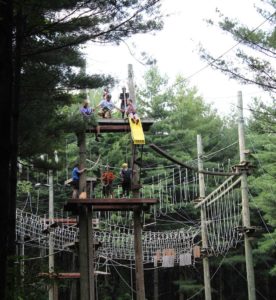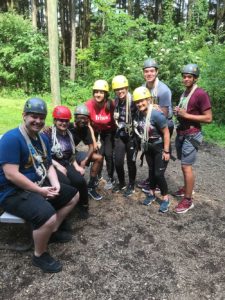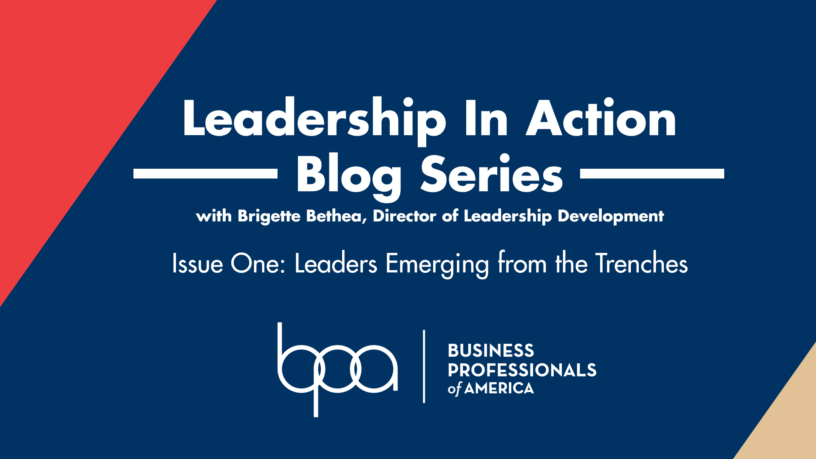When I was a new lieutenant in the Army, I found myself at various training facilities doing different obstacle courses, from high ropes to rock walls, zip lining and dropping 30 feet into what seemed like a perfectly good lake. Often, it seemed like the purpose of these events was to push me and my fellow soldiers beyond our current level of comfort. Obstacle course days were among some of the most dreaded because I would feel vulnerable, look non-athletic, and worst of all might inevitably fail my team at a given task. It took a certain level of fortitude to go through obstacle after obstacle, especially with the fear of failure looming over me like a storm cloud. On the other hand, these were also some of my favorite days in the military because once the day was done, I likely experienced something different, supported my teammates in new ways, and learned something about myself as a leader that I didn’t know was possible. I was learning through experience and trying something uncomfortable to promote the emergence of new skills.

Doing things that are new and outside of our comfort zone tend to stretch us beyond our wildest belief. When I arrived in Columbus, Ohio, for National Officer Training in July, I was uncomfortable. I was the newest member of an organization that had a rich history and dedicated members. I had only been on the job three weeks and was about to spend time training and developing BPA’s newly elected student National Officers. The pressure was on to perform. It was like the first day at a new school. I was nervous wondering if the other kids would like me and if I looked and sounded cool. Very quickly, though, my anxiety started to go away as I began collaborating with my National Center teammates and working with eight eager and truly driven National Officers.
We spent most of our time together in a conference room learning about how to be a National Officer, as well as the ins and outs of BPA, from BPA Cares to travel etiquette. As the days went on, I began to feel more and more comfortable, as did everyone else, and anxiety was replaced with excitement as we got to know each other and collaborated on the program of work that will carry this National Officer Team through their term. Then it happened; it was time to transition to the outdoor obstacle course and activities (inserts music while camera zooms in on my face…”dun dun duunnnn”) made up of a ropes course suspended 30 feet in the air! When we arrived on site, the nervousness instantly reentered my body and I could feel myself tensing up just like it was the first day of training all over again. I could sense the comfort level of the Nationa l Officer Team shifting as well. In all honesty, I didn’t want to look bad in front of the officers and my teammates. It was a place of vulnerability. Not to mention, I also have a moderate fear of heights, and even though I’ve done my share of obstacle courses, this was the first time I led a group through these types of activities. To put it bluntly, I was uncomfortable.
l Officer Team shifting as well. In all honesty, I didn’t want to look bad in front of the officers and my teammates. It was a place of vulnerability. Not to mention, I also have a moderate fear of heights, and even though I’ve done my share of obstacle courses, this was the first time I led a group through these types of activities. To put it bluntly, I was uncomfortable.
That being the case, I still knew that I had to serve as the leader in this experience. I positioned a challenge to the officers by sharing that, while I did not expect for themto do all of the obstacles, it was my hope they would at least try something new, albeit uncomfortable. One by one, we began to climb what looked like a telephone pole with small metal pegs sticking out of the sides, heading up into the treetops. And that’s when it hit me. While many of us were dreading this activity for a variety of reasons, I realized that once this experience was over we will have learned things about each other and ourselves that were priceless. Each step that was taken up the pole and above the treetops opened up a new level of confidence. It wasn’t too long after that we were going from doubt and fear to laughter and support of one another. The communication and trust was growing amongst the team right in front of our eyes. I watched myself and the others embrace the teamwork, becoming fully involved and invested in each other’s success. At one point, I looked across the tree line to see two of the officers had broken away from the group and completed over 15 different obstacles which required mental and physical toughness. I would have anticipated that one of these two individuals would have broken away like this, but the other not only surprised me, it also surprised herself in the process (which she declared multiple times while suspended 30 feet in the air). I watched as she kept going, pushing herself outside of her comfort zone through the most difficult obstacles. She challenged herself completely. She didn’t just go toward the obstacles she felt most comfortable with and knew she could complete, she went beyond. Her physical height or lack of experience became less important as she gained more confidence after every obstacle. Instead of turning back to the group, she emerged in that moment as a leader, seeking feedback from the officer who went before her and serving as an example to those looking at trying something new behind her. I could see that it was difficult for her, but she didn't shy away from the challenge, even with the possibility of failure, not looking as polished, or potentially doing it incorrectly the first time.
So, you’re probably wondering, what is the point of all this? You may be thinking “I get it Ms. B~ you’re saying that challenging yourself to take on new and difficult tasks supports team building and character development.” Yes! That’s exactly what I am saying! But, I am also saying that the emergence of new leadership skills requires you to become cognitively, emotionally, and physically involved in order for that shift to happen. Just like the National Officer Team, each member of your BPA team possess a unique set of talents and strengths, some of which may not yet be realized simply because you have not had the opportunity to change environments. So taking a step back and looking from the outside in, what this means is that in order to foster the emergence of leadership, you sometimes have to put yourself in uncomfortable situations. And on the flip side, sometimes your leadership has to put you into uncomfortable situations in order for there to be true growth.
When it comes to your development this year, I invite and encourage you to emerge from the trenches and allow yourself the ability to be vulnerable, accept a new challenge, notice the strengths of others in a different environment, and put leadership into action!
Follow Brigette on Twitter @bpaleadership

